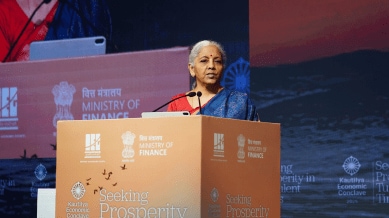CALLING India’s rise as a stabilising force on the global stage as “neither accidental nor transient”, Union Finance Minister Nirmala Sitharaman, in an apparent reference to the US, said Friday that the “absolute dominance once enjoyed by a hegemon is now contested.”
Speaking at the Kautilya Economic Conclave, organised by the Ministry of Finance and the Institute of Economic Growth, the Finance Minister said that sanctions, tariffs and decoupling strategies are testing alliances that once appeared solid and are creating new coalitions. These dynamics, she said, highlight vulnerability and resilience for India and the choices the country makes will determine “whether resilience becomes a foundation for leadership or merely a buffer against uncertainty”.
Framing today’s challenge as a “structural transformation” rather than a temporary disruption, Sitharaman posited key questions she said the gathering needs to reflect upon: “What lies on the other side of this transformation? What will the new equilibrium look like? Who will shape it? On what terms will it be shaped?”
The answers to these may be elusive but they will shape the future and impact the lives of citizens worldwide, she said.
The scale of change is also so sweeping and unprecedented that its challenges are unique, she said. For most of us in our lifetime, the “arc of history never bends, we only see the upward slope,” she said, adding that “confidence in continuity” is on the wane as the “arc of history is bending now.”
India’s growth, Sitharaman said, is “firmly anchored” in domestic factors and it has to clock GDP growth rates of 8 per cent to become a developed nation by 2047 – one of the twin tracks the nation was on, the other being defined by self-reliance.
“For decades, many Asian nations absorbed the material gains of globalisation without adopting the same political values that underpinned Western society,” she said. “Today, they assert alternative models of growth and governance, drawing on their civilisational continuities. Their emergence questions the assumption that Western liberal values are the only path to economic success… The absolute dominance once enjoyed by a hegemon is now contested.”
Story continues below this ad
Referring to the theme of the conclave, “Seeking Prosperity in Turbulent Times,” the Finance Minister said that saying the present is “turbulent” would understate the scale of challenge at hand, adding that foundations of the global order are “shifting beneath our feet”.
Structural transformations, not temporary disruptions
Sitharaman said the global landscape had shifted such that it resembled a “zero-sum approach”. This, she said, was a result of the failures and limitations of the previous era of globalisation.
“The rapidity of events unfolding ensures that the world we wake up to often feels
different from the one we went to sleep with. Shifts that once transpired over decades are now condensed into months or even weeks,” Sitharaman said, adding that the task is not just to manage uncertainty but to confront imbalances.
Story continues below this ad
The return of Donald Trump to the US Presidency has seen the imposition of sweeping tariffs on goods entering the world’s largest economy, with India facing a penal tariff of 25 per cent for its import of Russian oil and arms, on top of a reciprocal tariff of 25 per cent.
India enjoyed a significant merchandise trade surplus of $41 billion with the US in 2024-25, as per commerce ministry data. Trump, who wants to erase the US trade deficit with its partners, has looked to strike favourable bilateral agreements that include promises of investment in manufacturing capacities in the US in exchange for lower tariffs. India, which was one of the first countries to begin talks with the US over a trade deal, however, continues to face higher tariffs as negotiations continue.
In her address, the Finance Minister noted that trade imbalances have “hollowed out industries in some nations while creating overcapacity in others”.
On imbalances related to energy, Sitharaman said they have made some countries “chronically dependent” on costly imports. At the same time, others are subsidising their industries with cheap, carbon-intensive power.
Story continues below this ad
“Net-zero commitments, pursued without regard to trade-offs, risk driving up costs for developing economies while constraining their growth. These imbalances have become structural features of our world, distorting incentives and fuelling political discontent,” she said.
Crises before renewal
Saying that history had shown that crises often precede renewal, Sitharaman said today’s global fragmentation “may give rise to more sustainable and unforeseen forms of cooperation”. The challenge, though, is to ensure that inclusive principles shape cooperation.
“For developing countries, this is a necessity, not just a romantic aspiration. We cannot afford to be passive spectators in a world where decisions elsewhere determine our destinies. We must be active participants, shaping outcomes where possible and preserving autonomy where necessary,” she said.
Commenting on India’s growth performance, the Finance Minister said India has set in motion a twin-track approach for the next few years, with the first track being becoming a developed economy by 2047 and the second track being atmanirbhar, or self-reliant. However, this did not mean India would shut itself and “look inward”.
Story continues below this ad
Sitharaman highlighted that the government has consistently focused on fiscal consolidation, improved expenditure quality with higher capital expenditure, and bringing inflation under control.
“However, just as eternal vigilance is the price of liberty, eternal performance is the price of strategic independence. There is no room for complacency or self-congratulation beyond a quiet confidence in our abilities to take the right decisions and execute them,” she said.
Speaking at the event, N K Singh, Chairman of the 15th Finance Commission and President of the Institute of Economic Growth’s Board of Trustees, said India needs to raise its growth rate to 8 per cent, improve its incremental capital output ratio, and replicate the partnership the Centre and states have shown when it comes to the Goods and Services Tax regime to other spheres as well.
